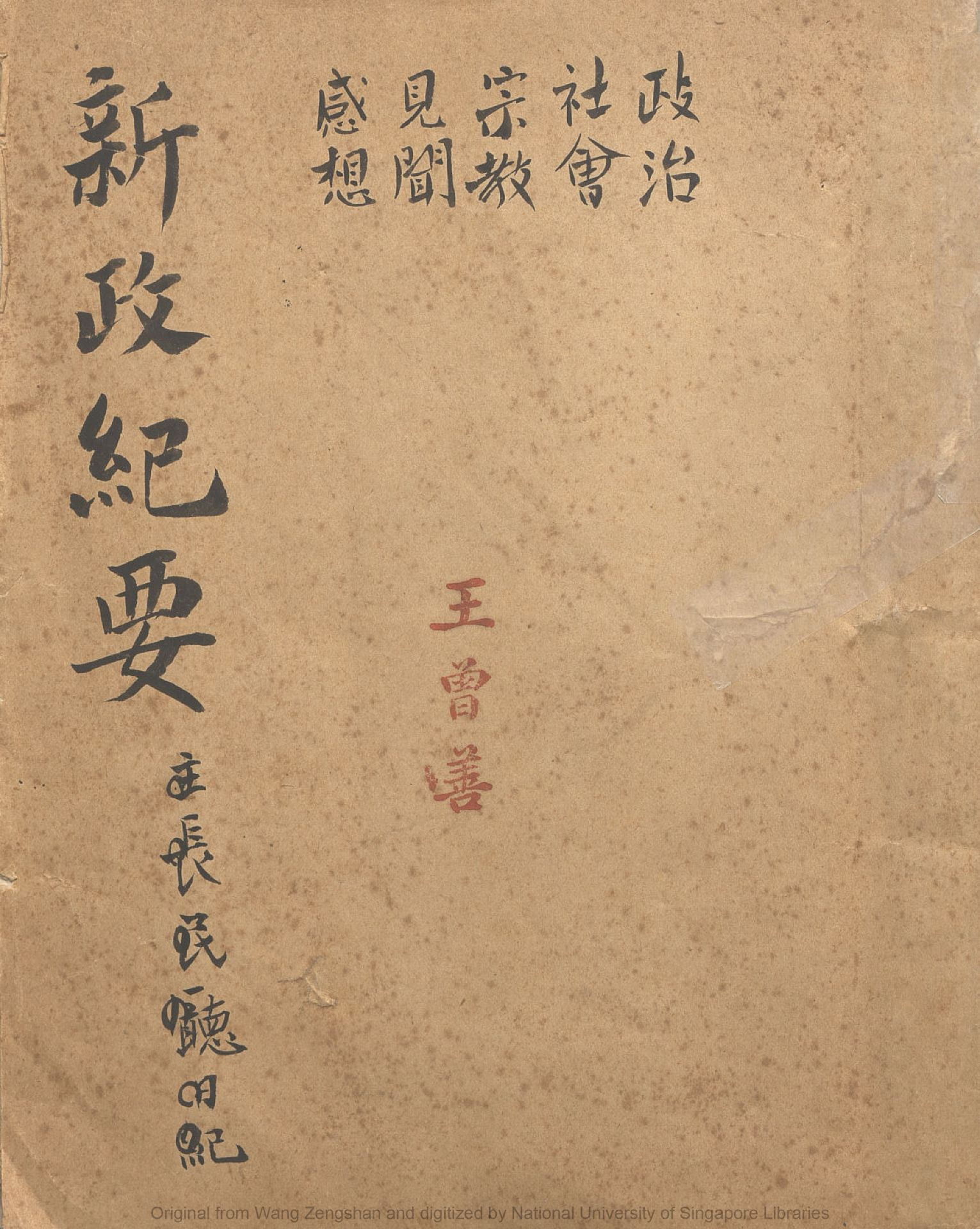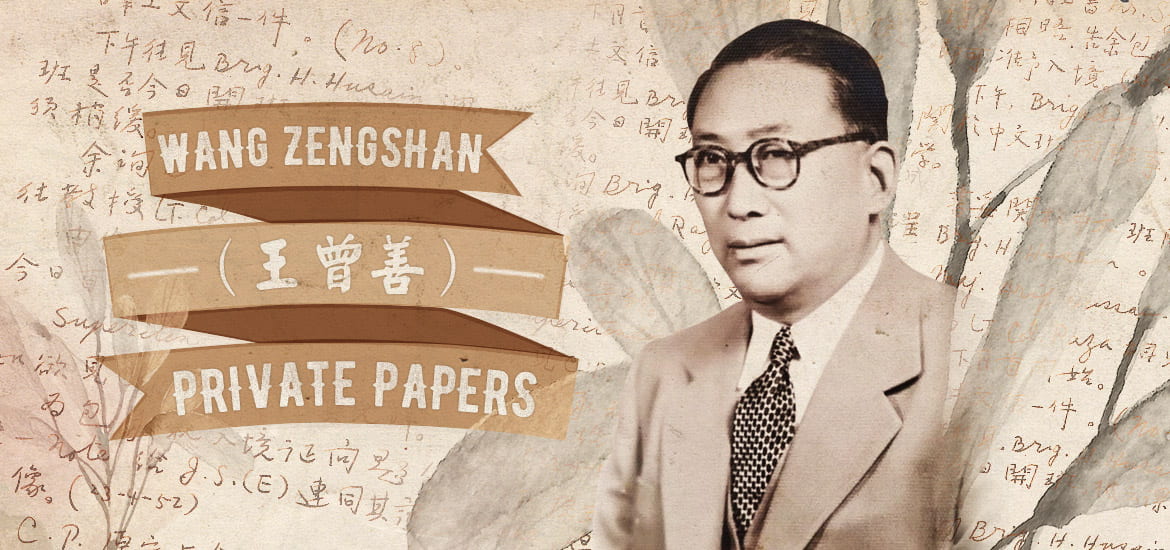The Wang Zengshan Private Papers Collection consists of correspondence, diaries, speeches, telegrams, photographs and reports which covered most of his working and personal life from the 1930s to 1950s in his various capacities and vocations, and some of his works on Muslim philosophy, culture and history in Chinese, English, Turkish and other languages. The Collection was deposited by Dr Rosey Wang Ma, a daughter of the late Wang Zengshan.
The Collection narrates the story of a prominent Chinese Muslim intellectual and activist. It recounts his political activities in pre-communist China and his life in exile after leaving China in September 1949 just before the Communist victory in October. For researchers who are interested in Wang Zengshan, these documents are invaluable; for those who are interested in Chinese Muslims and their history, they are of the utmost import.
|
Wang Zengshan was born in 1903 into a Hui family in Linqing, Shandong province in China. When he was a young boy, his father brought him to Beijing for his education. He graduated from Yenching University in 1925. Three years later, Wang left to pursue his graduate studies in history at Istanbul University in Turkey which he completed in 1930. Upon his return to China in 1931, Wang pursued a political career and became a member of the Guomindang’s Legislative Assembly. He remained committed to promoting ties between China and the Islamic world, and frequently published articles about the Islamic world and promoted opportunities for Muslims in China to study abroad in Turkey. Wang was very active in the Chinese Muslim Youth Association and edited the association newsletter for a period of time. In July 1937, the Sino-Japanese conflict erupted into a full-scale war. Not receiving much help from other countries in the struggle against Japan, the Nationalist government called upon ordinary citizens to engage in “citizen diplomacy” in support of the Chinese cause. In response, Ma Tianying proposed to the Nationalist authorities the idea of sending a delegation to the Middle East. A delegation of five young Muslim activists was assembled by the Chinese Muslim Progressive Association. Wang Zengshan was |
appointed as head and Ma Tianying with Zhang Zhaoli, Xue Wenbo and Wang Shiming joined as members. The Chinese Muslim Delegation to the Near East, visited 13 Muslim countries between December 1937 and February 1939. The Delegation met with kings and prime ministers, visited mosques, spoke at prayer meetings, and participated in the meetings of various Islamic organisations. During the Japanese war years from 1937-1945, Wang lived in Nanjing and Chongqing, and was Guomindang Minister of Civil Affairs in the Xinjiang Provincial Government from 1946 to 1949. He left Dihua (now Urumqi) in September 1949 just before the founding of the People’s Republic of China on 1 October 1949. With his large family, Wang made his way across the mountains to reach Kashmir before making his way to Lahore and Karachi where he obtained a position with the Pakistan government. In 1955, Wang migrated to Turkey with his wife and eight children. At the invitation of Istanbul University, he set up the first department of Chinese Studies in Turkey where he also taught as a professor for several years. At the same time, he did translation work and acted as honorary representative of the Republic of China in Istanbul. Wang passed away in 1961. |
Here, we present some fascinating highlights from the Wang Zengshan Private Papers Collection.
(1) The Chinese Muslim Delegation to the Near East (December 1937 – February 1939)
The delegation headed by Wang Zengshan visited 13 Muslim countries. Other members of the Delegation were Ibrahim Ma Tianying, Yusuf Zhang Zhaoli, Dawood Xue Wenbo and Wang Shiming. The delegation met with kings and prime ministers, visited mosques, spoke at prayer meetings, and participated in the meetings of various Islamic organisations.

Members of the Chinese Muslim Delegation to the Near East. From left to right: Ibrahim Ma Tianying, Dawood Xue Wenbo, Jelaluddin Wang Zengshan, Yusuf Zhang Zhaoli and Wang Shiming
When the Delegation returned to China in 1939, Wang gave speeches on many different occasions to share his experiences and reflections with regards to the mission of Delegation in support of the Chinese cause against Japan. Wang highlighted that the Delegation helped in building connections with the Muslim countries. Those countries had showed sympathy towards China and offered donations of money and medical supplies.

A note of his speech in a press release held at the Chongqing Municipal Bankers’ Association on 3 March 1939 about the Chinese Muslim Delegation to the Near East

A book entitled中国回教近东访问团日记: 附总报告书 (Diary of the Chinese Muslim Delegation to the Near East with Appendix of the General Report) was edited by Wang Zengshan and published in 1943
(2) Work diaries & corresponding documents
The work diaries include:
- 新政纪要: 主长民厅日记, a diary when Wang was Minister for Civil Affairs in Xinjiang from 1946 to 1949

- work diaries when he worked as Chinese teacher and translator in the Ministry of Foreign Affairs and Commonwealth Relations, Karachi, Pakistan from 1951 to 1955

- work diaries from 1955 to 1956 when he acted as honorary representative of the Republic of China in Istanbul, Turkey
Other than the diaries, there are also corresponding documents such as letters, telegrams and translation works attached in the diary folders.
(3) His writings on Islam and other works
Wang had written numerous works on Muslim philosophy, culture and history in Chinese and Turkish. Some of his writings include the biography of the Holy Prophet, an analysis of the Holy Quran and articles on Muslim countries.

五十年来之土耳其 (Turkey of 50 Years) narrates the history and political changes of Turkey in the 18th and 19th century.

至圣穆罕默德简史 (A Brief History of Prophet Muhammad) was published in Xinjiang Daily on 28 July 1949.

A journal article in Turkish entitled Cinde Islamiyet (Islam in China) was most likely published in Review of the Institute of Islamic Studies, Volume II/2-4: 157-188 (1960).


Please are there writings about the 1949 trip from Xinjiang to Pakistan? I would like to read that. Thank you!